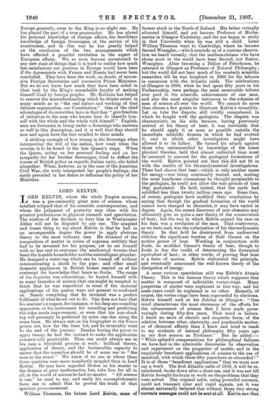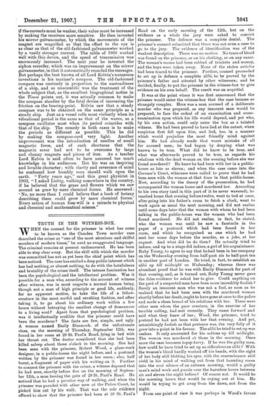LORD KELVIN. TI ORD KELVIN, whom the whole Empire mourns, was
a pre-eminently great man of science, whose intellect eclipsed that of his scientific contemporaries, and whom the judgment of posterity may class with his greatest predecessors in physical research and speculation. The wisdom of the decision to bury him in Westminster Abbey will not be disputed by any one. The simplest and truest thing to say about Kelvin is that he had in an incomparable degree the power to apply abstruse theory to the most ordinary uses. He dreamed of the composition of matter in terms of supreme subtlety that had to be invented for his purpose, yet he set himself with no less zest to overcome the mechanical worries that beset the humble householder and the unintelligent plumber. He designed a water-tap which can be turned off without communicating a shock to the pipe ; and other small domestic appliances in British homes remind us of his contempt for knowledge that bears no fruits. The range of his inquiries was astonishing ; he busied himself with so many branches of science that one might be tempted to think that he was superficial in some if the material applications of his genius were not present to confound us. Nearly everything that he invented was a perfect fulfilment of what he set out to do. One does not hear that his mariner's compass, for instance, or his deep-sea sounding apparatus, or his instrument for recording and predicting the tides needs improvement, or even that his non-shock tap will presently be perfected by some one else along the same lines. He always saw, as his biographer in the Times points out, how far the lines led, and he invariably went to the end of the journey. Besides having the power to apply theory, he had the instinct to make the application commercially practicable. Thus one could always see in his case a threefold process at work : brilliant theory, application of theory, and the businesslike capacity to secure that the invention should be of some use to " the man in the street." We know of no one in whom these three qualities were more manifestly mingled than in Lord Kelvin. He may have regarded Stokes as his master in the domain of pure mathematics, but, take him for all in all, in the world of science he had no master. " All science is one," he used to say, and really his accomplishments force one to admit that he proved the truth of that spacious pronouncement.
William Thomson, the future Lord Kelvin, came of farmer stock in the North of Ireland. His father virtually educated himself, and yet became Professor of Mathe- matics in Glasgow University, and the sou began to study in that University when he was still a child. Later William Thomson went to Cambridge, where he became Second Wrangler,—which reminds us of a curious observa- tion we beard recently, chat the mathematicians who have shone most in the world have been Second, not Senior, Wranglers. After becoming a Fellow of Peterhouse, he returned to Glasgow as Professor of Natural Philosophy ; but the world did not hear much of his masterly scientific researches till he was knighted in 1866 for his labours in connexion with the Atlantic cable. The celebrations at Glasgow in 1896, when he had spent fifty years in his Professorship, were perhaps the most memorable tribute ever paid to the scientific achievements of one man, and also the most singular testimony to the cohesion of men of science all over the world. We cannot do more than choose a few points to illustrate Kelvin's versatility. Let us take the dispute, still vividly remembered, in which he fought with the geologists. The dispute was characteristic on his side, because, having previously arrived at his theory of heat, it was inevitable that he should apply it as soon as possible outside the immediate scientific domain in which he had evolved it, and in which other investigators might have allowed it to lie fallow. He turned his attack against those who, untrammelled by knowledge of the latest physical theories, held that almost unlimited time must be assumed to account for the geological formations of the world. Kelvin pointed out that this did not fit in with the results of his thermodynamical investigations. These had shown that heat—which is only another name for energy—was being continually wasted, and, making the most handsome concessions he thought permissible to the geologists, he could not allow the vast periods of time they postulated. He held, indeed, that the earth had solidified less than twenty million years ago. Since then, of course, geologists have modified their conclusions by saying that though the gradual formation of the world cannot have changed in character, it may have varied in degree. Again, the recent discovery of new elements may ultimately give us quite a new theory of the conservation of heat ; but the way in which Kelvin argued his case on his data was a revelation of the man. That controversy, as we have said, was the culmination of his thermodynamic theory. In that field he disinterred from undeserved oblivion the significant treatise of Sadi Oarnot on the motive power of heat. Working in conjunction with Joule, he modified Carnot's theory of heat, though to Joule is due the credit of determining the dynamical equivalent of heat ; in other words, of proving that heat is a form of motion. Kelvin elaborated the principle, and eventually announced the well-known theory of the dissipation of energy.
A more curious speculation still was Kelvin's Atomic Theory. This is the famous theory which supposes that matter is composed of indivisible vortex-rings. Many properties of matter were explained in this way, and for some years could be explained iu no other. Recently, of course, the vortex-rings have been superseded by electrons. Kelvin himself said at his Jubilee in Glasgow : " One word characterises the most strenuous of the efforts for the advancement of science that I have made perse- veringly during fifty-five years. That word is failure. I know no more of electric and magnetic force, of the relation between ether, electricity, and ponderable matter, or of chemical affinity than I knew and tried to teach to my students of natural philosophy fifty years ago in my first session as Professor." But he added :- "What splendid compensations for philosophical failures we have had in the admirable discoveries by observation and experiment on the properties of matter, and in the exquisitely beneficent applications of science to the use of mankind, with which these fifty years have so abounded ! " It is of those "beneficent applications" that we must now say a word. The first Atlantic cable of 1858, it will be re- membered, broke down after a short use, and it was not till Kelvin brought his brain to work on the problems that they were solved. The original cable, using powerful currents, could not transmit clear and rapid signals, yet it was almost universally believed that without those very strong curreuta messages could not be sent at all. Kelvin saw that , if the currents must be weaker, their value must be increased by making the receivers more sensitive. He then invented his mirror galvanometer, by which the movements of the magnet are magnified so that the effect to the eye is as clear as that of the old-fashioned galvanometer worked by a vastly stronger current. The cable of 1866 worked well with this device, and the speed of transmission was enormously increased. The next year he invented the siphon recorder, which was an improvement on the mirror galvanometer, in that it automatically recorded the messages. But perhaps the best known of all Lord Kelvin's numerous inventions is his mariner's compass. The old-fashioned compass was unsteady in proportion to the unsteadiness of a ship, and so unscientific was the treatment of the whole subject that, as the excellent biographical notice in the Times points out, it was actually common to make the compass steadier by the fatal device of increasing the friction on the bearing-point. Kelvin saw that a steady compass was to be obtained on the same principle as a steady ship. Just as a vessel rolls most violently when its vibrational period is the same as that of the waves, so a compass oscillates most when its period coincides with that of the ship. The remedy in both cases is to make the periods as different as possible. This he did by making the compass-card very light. Another improvement was the introduction of needles of small magnetic force, and of such shortness that the magnetic error had not to be overcome by large and clumsy magnets and pieces of iron. As a teacher Lord Kelvin is said often to have assumed too much knowledge in his audiences. But his was an inspiring and lovable character ; with clarity and reverence of mind he confessed how humbly man should walk upon the earth. " Forty years ago," said this great physicist in 1903, " I asked Liebig, walking somewhere in the country, if he believed that the grass and flowers which we saw around us grew by mere chemical forces. He answered : No, no more than I could believe that a book of botany describing them could grow by mere chemical forces.' Every action of human free-will is a miracle to physical and chemical and mathematical science."















































 Previous page
Previous page